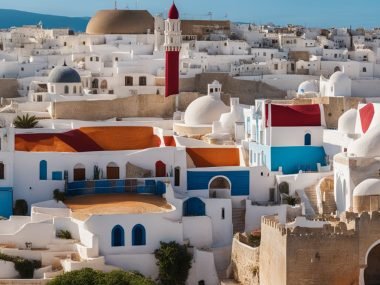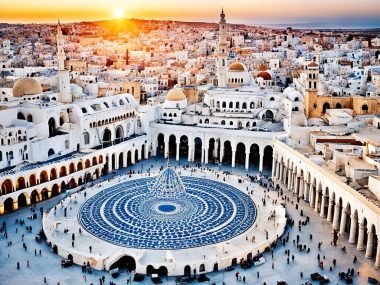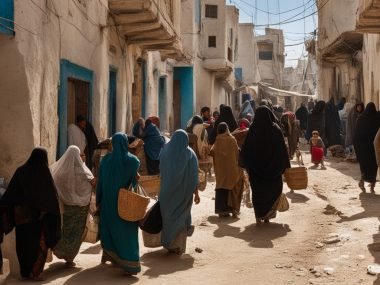It has been almost ten years since the Tunisian uprisings began the Arab Spring. As Tunisia marks this special tenth anniversary, there’s a lot to think about. The changes are big, like a new constitution and free speech.
Tunisia has come far, moving towards democracy from a strict regime. Yet, some people miss the old days for the stable economy. But finding their voice as a nation is a big win.
Key Takeaways
- Tunisia’s journey since the Arab Spring has reshaped the country’s political landscape.
- The rewriting of the constitution and ushering in freedom of speech are significant achievements.
- Despite economic challenges, the discovery of a collective voice remains a key outcome of the Tunisian revolution.
- Political change in Tunisia is ongoing, grappling with the past while pursuing democratic ideals.
- Some Tunisians reflect on the pre-revolution era for its economic metrics, highlighting the complexity of revolution outcomes.
The Political Transformation
Tunisia saw big changes after the Arab Spring. The biggest change was rewriting the constitution. This started a new way of governing. It shows hope for more changes in the future. The progress in Tunisia after the revolution shows a move toward more democracy.
The New Constitution and Free Speech
A new constitution started a big change in Tunisia. It made clear the different roles in government. It also protected freedom of speech in Tunisia. Now, people can say what they think without being scared. This was not possible before the revolution.
The Rise of Democratic Institutions
With the rewriting of the constitution, new democratic groups appeared. These groups support Tunisia’s new democracy. They are sometimes seen as just for show. But, they are key for Tunisia’s growth after the Arab Spring. They help the political changes keep going.
Economic Challenges Post-Arab Spring
After the Arab Spring, Tunisia has been facing tough economic times. This has worried both leaders and the people. Many hoped for better days but found hurdles blocking growth.
Unemployment and Corruption
Unemployment is a big issue in post-revolution Tunisia. It’s alarmingly high and corruption in Tunisia makes things worse. Corruption stops growth and keeps foreign investments away.
Nepotism and favouritism waste resources. This makes it hard for new businesses to do well.
Impact of Austerity Measures
Austerity measures were meant to fix the finances. But, they’ve often hurt Tunisia’s economy more. They’ve made life harder for many. The COVID-19 pandemic made things even tougher.
“Tunisia has faced significant economic turmoil post-revolution, with three primary challenges: high unemployment, pervasive corruption, and the adverse effects of austerity measures.”
| Economic Challenge | Description |
|---|---|
| Unemployment | High rates of joblessness, especially among youth, with limited prospects for improvement. |
| Corruption | Widespread corruption hampers economic development and fair distribution of resources. |
| Austerity Measures | Government-enforced spending cuts leading to increased hardship for the populace, especially during the COVID-19 pandemic. |
Social Progress Amidst Turmoil
Tunisia has seen a lot of social progress, despite political turmoil. The country has made big steps in civil liberties. This includes freedom of speech and civil rights. Civil society has played a big part in these positive changes.
Freedom of Expression and Civil Rights
After the Tunisian revolution, people now enjoy more freedom. They can speak their minds without fear. This is a big change from the past. Tunisia’s journey shows it values civil liberties more now.
The Role of Civil Society
Civil society in Tunisia has been key to social progress. Groups and activists have fought hard for freedom and rights. Their dedication helps ensure these values stay part of Tunisia’s culture. This shows their strong commitment to making things better, despite political challenges.

| Aspect | Pre-Revolution | Post-Revolution |
|---|---|---|
| Freedom of Expression | Limited and Controlled | Significantly Enhanced |
| Civil Rights | Suppressed | Greatly Improved |
| Civil Society’s Role | Minimal Influence | Key Driver of Change |
Evaluating Political Reforms in Tunisia
Tunisia has tried hard to reform after the Arab Spring. They want to change but face many hurdles. Looking closer at anti-corruption steps and unstable government sheds light on the situation.
Steps Taken Towards Anti-Corruption
They’ve really focused on fighting corruption. Many anti-corruption initiatives started for more openness and responsibility. A special body was made to keep an eye on these reforms.
Yet, the outcomes are mixed. Some big cases were tackled, showing some progress. But skepticism remains high among the public. They doubt the real impact of these steps.
Struggles with Government Instability
Since the revolution, the government has been shaky. Many government changes and fights have hurt reform efforts. This instability has weakened trust in the leaders.
The table below shows key efforts and their effects amid these issues:
| Reform Initiative | Objective | Challenges | Impact |
|---|---|---|---|
| National Anti-Corruption Authority | Enforce anti-corruption measures and increase transparency | Inconsistent enforcement, political interference | Moderate success, high-profile prosecutions |
| Judicial Reforms | Ensure judicial independence and impartiality | Political influence, slow implementation | Slow progress, ongoing efforts |
| Legislative Amendments | Update laws to support anti-corruption | Bureaucratic delays, resistance from vested interests | Partial updates, uneven enforcement |
Making real political changes in Tunisia is still a work in progress. There are some wins, but shaky government remains a big hurdle.
Impact on Daily Lives: Public Opinion
More than ten years have passed since the Arab Spring. The mood in Tunisia has changed a lot. There’s now more realism than hope, due to lasting economic problems.
People are unhappy with how things are going. Many face joblessness, high prices, and corruption everyday. These issues have changed what people thought life would be like after the Arab Spring.
Looking closer at how Tunisians feel shows a big change. Early joy has turned into disappointment for many. They think their country is on the wrong path. This reflects the widespread unhappiness in Tunisia today.
Here’s a summary of how feelings have shifted:
| Aspect | Post-Revolution Optimism | Current Discontent |
|---|---|---|
| Economic Expectations | High hopes for growth and employment | Rising unemployment and inflation |
| Civil Liberties | Increased freedom of expression | Economic struggles overshadow progress |
| Government Performance | Anticipation of transparency and accountability | Persistent corruption and inefficiency |
Overall, the story since the Arab Spring is about new freedoms and ongoing economic troubles. These have shaped what Tunisians think and feel now.
Is Tunisia Better After Arab Spring?
Tunisia’s path since the Arab Spring is often looked at carefully. People have different views. This shows the varied results seen.
One important achievement is starting democratic ways. The political changes helped a lot. They made speaking freely easier and governance more clear.

Yet, being economically strong is still a dream. Many folks are unhappy with how slow things are getting better. This shows the difference between hopes and what is real now. This worry about money shows up often in Tunisian public sentiment.
| Aspect | Pre-Arab Spring | Post-Arab Spring |
|---|---|---|
| Political Freedom | Limited | Significantly Improved |
| Economic Stability | Relatively Stable | Challenges Persist |
| Social Freedom | Restricted | Enhanced |
In summary, looking at Tunisia’s journey reveals major progress in democracy. But, there are still economic challenges. People feel mixed, seeing both good changes and ongoing struggles. This shows the real situation in Tunisia after the revolution.
Regional Challenges and External Influences
Tunisia is facing tough situations from nearby problems and help from other countries. This affects its society, politics, and economy. Big issues include the long war in Libya and the help Tunisia gets from other countries.
Effects of the Libyan Conflict
The war in Libya has caused big problems for Tunisia. With Libya in chaos, Tunisia now has more refugees. It also has less trade across the border. These issues add to Tunisia’s problems. The country is working hard to handle these effects from Libya.
International Support and Impact
But there is good news too. Countries around the world are helping Tunisia. They give money to support Tunisia’s economy. They also praise Tunisia for its progress in democracy and women’s rights. This help is very important for Tunisia. It helps the country deal with its own and regional problems.
| Area of Impact | Libyan Conflict Effect | International Support |
|---|---|---|
| Economic Stability | Increased Refugee Influx | Financial Aid Packages |
| Political Influence | Border Security Issues | Commendations for Democratic Progress |
| Social Stability | Disrupted Cross-Border Trade | Support for Women’s Rights |
Tunisia is working to keep a balance with the troubles it faces and the help it gets. By dealing with Libya’s conflict effects and using international aid, Tunisia can stay on the path to stability and growth.
The Role of Youth in Tunisia’s Future
The youth are central to Tunisia’s future. Their energy and dreams are vital. They play a big role in making society better and more wealthy. Yet, many young people are not happy because there are not many jobs.
Economic Discontent and Youth Unemployment
Many young people in Tunisia can’t find jobs. This makes them very unhappy. Not having a job can make them feel bad and hurt their health. The education they get doesn’t match the jobs that are there. This makes things worse.
Engagement in Political Processes
Even with these hard times, young people still take part in politics. They really want to make things better. They vote, fight for their beliefs, and join debates. By doing this, they help bring new ideas and solutions to their country’s problems.
Conclusion
Tunisia has had a tough but inspiring journey since the Arab Spring. Their progress includes both big wins and hard times. The shift to democracy was a huge change from old ways. People now enjoy more freedom, like freedom of speech. They can also question their leaders.
Yet, the country still faces big hurdles. Economic problems and corruption are major issues. Efforts to fight corruption haven’t made life better yet. This makes many people, especially the young, feel let down. There’s a real need for better plans to fix these issues.
Tunisia is now at a crucial point, ten years after the Arab Spring. It’s important to make the changes last for everyone. The government and people must work together for a fair and stable future. Despite the challenges, there’s hope. The strong will of the Tunisians gives us hope for a brighter future.







